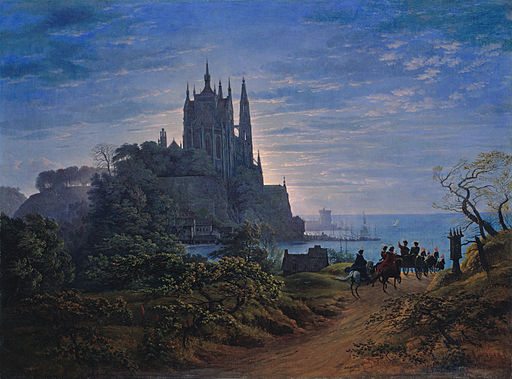“A nation that forgets its past has no future” (Winston Churchill, the statesman who defied the totalitarianism of both Nazism and Communism while countless other politicians appeased)
“Some people scoff at tradition. They are right if tradition is taken to mean that you must never do something for the first time; but how wrong they are if you regard tradition as a standard of conduct, handed down to you, below which you must never fall. Then tradition, instead of being a pair of handcuffs to fetter you, will be a handrail to steady and guide you in steep places.” (Field Marshal Viscount Slim of Burma, Courage and Other Broadcasts, 1957)
A Catholic who has fallen in love with the sense of tradition has not done so because he is nostalgic for the past, uncritically holds the past to be better than the present, and uses “tradition” as an excuse for inertia.
However, in order to explain why, in an epoch marked by unrelenting change, it is possible to claim that the Society of Ignatians is ultra-modern precisely becauseit is traditional, a few explanations may be helpful on the following topics, to each of which a separate page is dedicated. Among the topics dealt with are:
- The nature of “Tradition”
- The difference between “Tradition” and “Catholic Tradition”
- The difference between Catholic Traditionand Catholic traditions
The following section is an introduction.
Freed by Tradition from Conservatisms, Modernism, and Other False Starting Points
Tradition frees man from the mentality of prejudice and unrealism in general. It unshackles him from conservatisms. It liberates him from Modernism, both as worship of the modern era and as heresy. It vaccinates him against ideologies.
This is because Tradition is enslaved to neither system nor ideology nor prejudice but rather is anchored in Truth, in the unchanging truths of the cosmic Natural Law and in the Divine Revelation of the path to salvation which is found integrally in Catholicism. It is therefore utterly open, without any restrictions, to examining and knowing reality as it is and not as one pre-judges it to be. It accordingly breathes in and forth truth, goodness, and beauty, wheresoever in the cosmos it may originate.
Thus, it is no prisoner to any age, century, or society. It is neither “conservative” nor “liberal” nor “modern”. While it rejects a conservatism that stands against all innovation ‒ and, most dangerously, refuses to recognize that Catholic Tradition is non-negotiable because it is Truth, the truths of Divine Revelation and the Natural Law ‒ it also has an instinctive distrust of
“[T]he all-too-exclusive talk of the future‒as though for human beings there was only something to hope for and nothing to remember and nothing to be thankful for.
“Respect for tradition produces distrust of that zero-point radicalism that fancies it always possible to start again from scratch with a tabula rasa, as well as distrust of the inclination to treat each new moment as a “completely new situation,” and so forth.
“Against all this we shall have to take our stand on a very precise distinction. One one side such things as athe “To boldly go where no man has gone before” of interplanetary travel, new discoveries in treating cancer, newly bred varieties of roses, progress in making cars and cameras.
“All this I can welcome without reservation and even expect with impatience. It is however a completely different matter when someone speaks to me enthusiastically of a “radically new” understanding of human nature, of a new interpretation of eros or death that replaces everything men have thought about them, of a completely new access to god’s Word available for the first time to this generation, or of a completely changed conception of priesthood or sacrament.
“Then I immediately notice, before any discussion of individual points, a deep, unappeasable distrust rooted neither in some general will to stay in place nor in a principled rejection of “progress” but in the well-founded suspicion that in this area, to use Karl Jaspers’s expression, ‘novelty can speak against truth’. ‘In this area’ means wherever we are dealing with the whole of the world and reality; wherever the particulars of the sacred tradition are being proclaimed; wherever important topics are beyond the clutches of the exact sciences.” (Josef Pieper, Tradition, St. Augustine’s Press, 2010, pp. 58-59)
TRADITION
“Only a dying civilization neglects its dead” (C. Dawson)
History is not an independent reality, acting on its own. It is the divine action in time. Catholics know that the truth of Christ’s words “My Father is always at work and so am I” (check); ceaselessly His Providential action imbues the thoughts and aspirations of godly men and women whose achievements, embodied in language, are passed on as the precious inheritance within the Church’s Tradition and traditions, notably the sacred liturgy.
Hence tradition, in the widest sense of the reality, is the means by which mankind learns from the past through “the process of imitaiton, education and learning and to all that they hand on in like manner to their descendants and successors.” ( C. Dawson, Formation of Christendom)
Hence, a profound sense of solidarity in Catholicism with our brothers and sisters of the past – and of the future. The Catholic vision of society is a spiritual organism, a community not only of one’s contemporaries but also of the dead and of the yet unborn. “The men who died for the faith in third century Rome or sixteenth-century Japan are still partners in the common struggle, no less than those who are the leaders of Christian thought and action in our own days.” (C. Dawson, “Christian Culture: Its Meaning and Its Value”, Jubilee, vol. 4 (1956), 37.)
No Compromise Possible between Catholic Tradition and Secularism
The sacred society of the Church is the bearer of the sacred Tradition, the ensemble of eternally valid truths, principles that are utterly independent of the ebb and flow of history. Consequently, Tradition can never ally herself with secularism, the ideology of attempting to build a civilization on the principle that truth is a changeable reality, to be determined by each generation. Any such alliance would be an act of apostasy.
Tradition: Empowering Men to be Revolutionaries for Truth, Goodness, Beauty
Tradition is “ultra-modern” in the etymological sense of „ultra“ as „beyond“ since in its inner dynamism, freed from addiction to the contemporary, it’s eyes are capable of gazing into the future with the illuminating radiance of having appreciated the truths inherited from the past. In this way, Tradition empowers man with criteria to intuit new surges of truth, goodness, and beauty as they surge forth from human genius.
Thus, Tradition, century after century, has shown that it empowers men to be revolutionaries who, unlike those of 1789 and their like, build a culture, a society, a civilization of authentic love since they build it upon the truths of the Natural Law and of the Catholic Faith. Catholics like King Louis IX of France and the Fathers of the European Union, De Gasperi, Adenauer, and Robert Schuman.
More accurately, it empowers the lover of tradition to become a “counter-revolutionary” because he opposes the sudden, violent, “undemocratic” imposition of change by elites upon the masses, in defiance of eternally valid truths and time-tested customs that are the authentic social order in which man can find the environment in which to flourish.
The following pages will therefore unpack the reasoning behind the Society of Ignatians love for Tradition by firstly defining tradition and then, secondly, considering its effects and importance.


